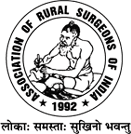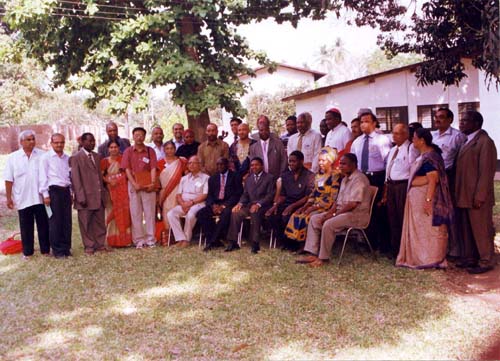|
Our ancient sages said some 5000 years ago
that the whole world is one family. I would not
know how and why they said that. But a
British geneticist, Walter Bodner also said
some thing like that, "we are all descended
from Africa". That obviously is a scientific
conclusion. And now last month I read that
another geneticist Spencer Wells, working on
a project for the National Geography and
IBM also stated that people in Europe,
Central Asia, India, Far East, Australia etc
migrated from Africa some 50,000 to
60,000 years ago. That means we from
India have come to our place of origin. That
idea makes me very happy indeed.
Our wise old sages from India used to pray

Sarve Bhavantu Sukhinaha Sarve Santu
Niramayaha,
Sarve Bhadrani Pashyantu Ma Kashchid
dukhbhagbhavet.
"May all be happy, may all be healthy,
may all see good things, may no one ever
have to suffer". Unfortunately this prayer has
never been fulfilled for all these centuries.
United Nations High Commissioner for
Human Rights declared in 1968 that "highest
attainable standard of health is a
fundamental birth right of every human
being". That has not made a lot of difference
to the poor either.
Then came the Declaration of W.H.O."Health for all by 2000 AD" in 1977, and
of Alma Ata conference declaration in 1978.
None of these have been effective as far as the health care of the poor is concerned. On
the other hand, the medical fraternity, whose
duty it is to look after the health also has been
indifferent in this area. Dr. Banoo Koya from
Maharashtra, India very correctly said that"we are happy with excellent health care of
the 5%, mediocre care of the 15% but we are
not at all concerned with the health care of
the remaining 80%!" As a result of all
this in India, in 1995, not more than 30% of
the population had any access to the basic
surgery. (Dr. Takavale1995). The situation in
other developing countries may not be very
different.
The developments and advancements of
health sciences have no respect for the cost
factors. To add to this is the present context of
globalization and everything that comes with
it. As a result, the noble profession that
medicine was has now become an ignoble
commerce. In stead of simplifying it the
practice of medicine and surgery is becoming
more and more complicated, day by day,
even to the practicing surgeons, leave alone
the patients. Perhaps that is why Austrian
philosopher Ivan Illich exclaimed that"…medical doctors have expropriated health
from public". A number of newer gadgets and
protocols are being introduced all the time.
These may be affordable by the developing
countries and the top 5 to 10% of Indian
population but they are certainly not within
the reach of nearly 70-80% of the rest. How
relevant or irrelevant these protocols are is
difficult to say. In such a state of affairs, I
believe, making health care affordable is far
more important than trying to follow the
academics or the latest standards.
Perhaps that is also the reason why in
Declaration of Alma Ata they opted for "acceptable level of health" and not the"highest attainable standard of health". The
Alma Ata conference in 1978 said that
Primary Health Care is the key to achieve the
goal of "Health for All by 200 AD." I believe,
Rural Surgery or what you call Primary Care
Surgery is the key to the surgical care of the
people.
Some surgeons from rural India got together
nearly 20 years ago and focussed attention of
all on to surgery as they practised it. They
called it Rural Surgery. To paraphrase what is
said of the Primary Health Care in the Alma
Ata declaration, rural surgery is "based on
practical, scientifically sound and socially
acceptable methods and technology, made
universally accessible to individuals and
communities at a cost that community and
country can afford…." In other words it is the
appropriate multi-disciplinary surgical care.
80% of the surgeons in India are
concentrated in urban areas and the
remaining 20% surgeons practice rural
surgery to serve the nearly 70% of rural
population and urban slum dwellers. Dr.
Halfdan Mahler the past Director General of
W.H.O. had said something to the effect that
only that technology is important which is
useful to the majority. Obviously, our new
concept of rural surgery was and is certainly
one such useful technology.
But this truth was unacceptable to the
academicians. Arthur Schopenhauer had
said: "All truth passes through three stages.
First it is ridiculed, second it is opposed
violently and third, it is accepted as being self
evident".
Association of Rural Surgeons of India has
literally experienced all these three stages.
Now the very concept has been accepted as
being obviously important for our nation. A
separate section of Association of Surgeons
of India on rural surgery has been started.
The Indian Government has started a Rural
Health Mission. Thanks to Dr. Shyamprasad,National Board of Examinations has started
Diplomate of Rural Surgery, a post graduate
course too. We hope that very soon this postgraduate
qualification in rural surgery will
give it the rightful status of a speciality.
When a technology has to be made
affordable, people innovate to cut costs and
to overcome the constraints. You have the
wonderful example of Prof. Awojobi inventing
a bicycle driven centrifuge. We in India too
have some great innovations that have made
health care more affordable.
- Jaipur foot. It is a low-cost lower limb
prosthesis, with which an amputee can
work in wet fields and even climb trees.
- Low cost Ventilator introduced by Dr.
Ghaisas does not need the costly oxygen
as operating force.
- Mosquito net introduced by Dr. Brahma
Reddy for hernia repairs is a very cheap alternative.
- Our past president of India, Dr. Kalam
gave light alloy of space technology to
reduce the weight of prosthesis for poor
children.
|
With all these and many more, rural surgery
in India is gradually becoming popular, more
patient friendly and also effective.
International Federation of Rural Surgery was
an idea put forth by Dr. Thomas Moch, our
present Secretary and Dr.J.K. Banerjee,
present president of ARSI. The main purpose
of I.F.R.S. is to pass on the message, that rural
surgery is best suited to the developing
countries. I feel that each of your countries
needs to modify surgery to suit its people and
its health problems. It is by no means a quick
fix solution. What Dr. Halfdan Mahler said for
Primary Health Care is true for Rural Surgery
too. He said "What we need most of all is
singleness of purpose, absolute determination
to overcome obstacles, trial and error and
retrial, and refusal to retreat in frustration if
progress is slower than we would like". At the end of it all you will be proud of the rural
surgery you developed for your country.
It is said that men and nations act wisely
when they have exhausted all alternatives.
You do not have to wait till you exhaust all
your alternatives. Develop your surgery
keeping your alternatives. Innovations need
only the God given wisdom. Such wisdom is
seen in almost all communities and I am sure
you too have wise people in your countries
and you too may create many useful
innovations. By all means use all the help
from abroad, it will be unwise to start from
the beginning; but develop your own surgery
best suited to your people and your country.
Aim for self-dependence. Self-dependence will make you proud of yourselves. We are
proud of all our innovations and the
mosquito net, which is symbolic of our
attempts to reduce the cost of surgery, and a
dignified and very effective alternative to the
imported proline mesh.
It is my sincere hope and the hope of I.F.R.S.
and A.R.S.I. that this meeting will stimulate
the desire in the hearts of all surgeons and
nations of Africa to work for the health care
of the poorer section of each country. By the
time we meet in two years for the next
conference, we hope that we will have many
more associations or societies of rural
surgeons in from different parts of Africa. May
God bless you all.
(Proceedings of IFRS general body meet will be published in the next issue) |











